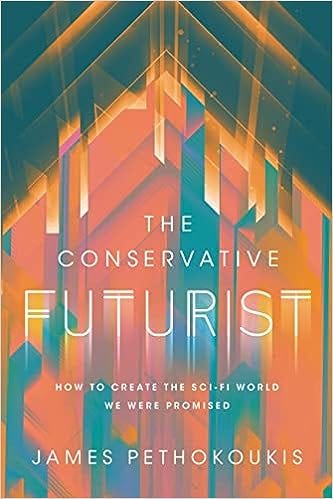🛢 Was the Shale Revolution a missed opportunity?
When you get a great innovation, push for more. Don't let a technological breakthrough go to waste.
Quote of the Issue
"As long as we're living and breathing, there's more we can do. We just have to be strong enough." – James Holden, The Expanse
Some self promotion: I have a book coming out on October 3. The Conservative Futurist: How To Create the Sci-Fi World We Were Promised is currently available for pre-order pretty much everywhere. I’m very excited about it! Let’s gooooo! 🆙↗⤴📈
The Essay
🛢 Was the Shale Revolution a missed opportunity?
The two greatest innovations over the last decade of the 20th century and the first decade of the 21st century were the PC + internet + smartphone combo and the Shale Revolution. In the former case, the unprecedented access to information, communication, and entertainment is now pretty much everything that humanity talks about and thinks about. No arguments about the significance of the IT Revolution.
But there’s been less appreciation, certainly by much of the media, of the Shale Revolution. It’s been a biggie, however. The increase in oil and natural gas production in the United States from unconventional sources such as shale rock, via hydraulic fracturing, unexpectedly turned the US into a major crude oil exporter, marking the peak of the notion of Peak Oil. US shale oil production rose by more than 7 million barrels per day from 2010 to 2019, according to the Dallas Fed, tripling total US oil production. The Shale Revolution also accounted for a tenth of the increase in US economic growth from 2009 through 2019. This is a pretty amazing chart:
The inconvenient truth about the benefits for fracking
And while many environmentalists were and continue to be resolutely anti-fracking, their criticism ignores an inconvenient truth. The rapid increase in shale gas extraction starting in 2009 led to natural gas supplanting coal as the primary energy source for electricity generation in the US. Due to natural gas releasing substantially less carbon per unit of energy compared to coal, carbon dioxide emissions from the electric power sector in the US reached their highest point in 2007 and have declined steadily since that time, according to the new NBER working paper, “Climate Change, Directed Innovation, and Energy Transition: The Long-run Consequences of the Shale Gas Revolution” by Daron Acemoglu, Philippe Aghion, Lint Barrage, and David Hémous, or AABH. Specifically, the researchers find that the “shale gas revolution led to an 11.2 percent decline in the CO2 intensity of US electricity production and reduced emissions levels by about 4.2 percent.”
Beyond those inconvenient findings, AABH raise and attempt to answer an interesting question: Despite all of its short-term economic and environmental benefits, did sub-optimal public policy make the Shale Revolution a missed opportunity to help nudge the American economy more quickly toward a future of abundant, cheap, and clean energy?
To answer that question, AABH build a model to analyze the trade-off between the short-term and long-term effects of shale gas on welfare and emissions. The model considers three types of energy sources: coal, natural gas, and renewables. it also incorporates innovation, externalities, and substitution effects among different energy sources. It’s an analysis related to an economic concept you may be familiar with, the Jevons Paradox: the idea that as innovation increases the efficiency with which a resource is used, we might use more of that resource because those efficiency gains lead to greater affordability and thus higher demand.
(Classic examples: More efficient lighting and appliances may cause people to use more electricity rather than cutting back their usage. Likewise, more fuel-efficient cars may lead to people driving more, since it's cheaper for them to do so. My favorite example is how building more roads to ease congestion may actually have little effect on traffic or even increase traffic. Those nice new roads may increase driving demand both from current drivers and those who previously would walk, bike, or take public transit.)
One could imagine, then, that in the short run, the natural gas boom could generate two opposing impacts, as AABH explain:
First, there is a substitution effect, as natural gas is used increasingly in place of both dirtier coal-based energy and cleaner renewables. Under the plausible assumption that renewables are a small part of energy production. Initially, this substitution effect reduces carbon emissions. Second, and in opposition to this substitution mechanism, there is a scale effect. Namely, the shale gas boom reduces the overall price of energy which encourages energy consumption and thereby increases aggregate CO2 emissions. The substitution effect dominates the scale effect and short-run emissions decline as long as natural gas is sufficiently clean compared to coal.
Shorter version: Substituting gas for coal reduces emissions. But cheaper energy increases overall consumption, raising emissions. Initially, gas is cleaner than coal, so replacing coal dominates, and emissions decline. But consumption effects counteract this over time.
A policy path not taken
But what about over the longer run?
Keep reading with a 7-day free trial
Subscribe to Faster, Please! to keep reading this post and get 7 days of free access to the full post archives.






